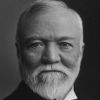




 "I choose free libraries as the best agencies for improving the masses of the people, because they give nothing for nothing. They only help those who help themselves. They never pauperize. They reach the aspiring and open to these chief treasures of the world -- those stored up in books. A taste for reading drives out lower tastes." - attributed to Andrew Carnegie in the April 1900 issue of The Library Journal
"I choose free libraries as the best agencies for improving the masses of the people, because they give nothing for nothing. They only help those who help themselves. They never pauperize. They reach the aspiring and open to these chief treasures of the world -- those stored up in books. A taste for reading drives out lower tastes." - attributed to Andrew Carnegie in the April 1900 issue of The Library Journal
To achieve this equality of education is the library not as important as the public school? Why do we often think of the library as something separate from public education and not an important part of the greater whole of educating the populace? If the school educates, then the library reinforces by giving continued access to information to any citizen willing to listen.
 Consider that schools always have advocates. The teachers and the unions lobby for better funding. The parents of the students direct their ire towards poor educational standards. And even the students themselves agitate if the schools fail to educate and prepare them for adulthood. Who advocates for the library and the library users? Perhaps the answer to this lack of advocacy is for the librarians themselves to convince everyone of the library's importance to society.
Consider that schools always have advocates. The teachers and the unions lobby for better funding. The parents of the students direct their ire towards poor educational standards. And even the students themselves agitate if the schools fail to educate and prepare them for adulthood. Who advocates for the library and the library users? Perhaps the answer to this lack of advocacy is for the librarians themselves to convince everyone of the library's importance to society.
Continue reading about how libraries are working toward this end...